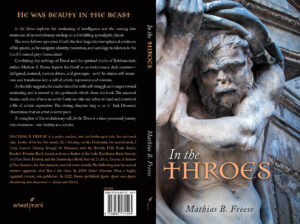Sci-fi author Mathias B. Freese is back to chat with me about his new science fiction fantasy, In the Throes.

Bio:
Mathias B. Freese is a writer, teacher, and psychotherapist who has authored ten books. After his first novel, The i Tetralogy on the Holocaust, his second work, I Truly Lament: Working Through the Holocaust, won the Beverly Hills Book Award, Reader’s Favorite Book Award, and was a finalist in the Indie Excellence Book Awards, the Paris Book Festival, and the Amsterdam Book Festival. In 2016, Tesserae: A Memoir of Two Summers, his first memoir, received seven awards. The following year his second memoir appeared, And Then I Am Gone. In 2019, Nina’s Memento Mori, a highly regarded memoir was published. In 2022, Freese published Again. Again and Again: Awakening into Awareness – Essays and Stories.
Welcome back to Reviews and Interviews, Mathais.
Please tell us about your newest release.
Originally conceived and written in my middle thirties as I struggled to integrate my western analytical learnings with my abundant interest in the writings of Krishnamurti, I spent one summer knocking out two or three chapters per week in white heat. Unknown to me I was expressing my metaphorical self. I laid the book aside for over five decades. It is a better book for that, for the throes I experienced have now been laid to rest.
What inspired you to write this book?
At unconscious levels I set out to define myself and I learned many years after I had indeed become an artist, a foreign substance to me at the time I wrote the book.
Excerpt from In the Throes:
He was beauty in the beast
In the Throes explores the awakening of intelligence and the coming into awareness of an evolutionary mishap on a forbidding apocalyptic planet.
The story follows eponymic Gruff, the first linguistic/metaphysical awakener of his species, as he navigates identity, mentation and ontology in relation to the gruff’s natural prey: humankind.
Combining the writings of Freud and the spiritual truths of Krishnamurti, author Mathias B. Freese depicts the gruff as an evolutionary dark creature – disfigured, maimed, instinct driven and grotesque—until he attains self-awareness and transforms into a self of artistic expression and wisdom.
As the title suggests, the reader identifies with the self-struggle as it surges toward awakening, and is moved by the apotheosis which closes the book. The nuanced theme that each one of us is an artist if only we take our selves in hand and construct a life of artistic expression. The closing chapters of this book sing to us of Isak Dinesen’s observation that an artist is never poor.
A metaphor of the evolutionary self, In the Throes is a time-processed journey into awareness –our destiny as a species.
What’s the next writing project?
Sojourner is the title and it is already written. It is a quest novel based on research about the Chinese who migrated to California. I worked at a federal project composing racial/ethnic materials for public schools. I was drawn to the Chinese experience, of how they ventured to come to the Mountain of Gold, the name they gave to California. It became quite an existential book and was almost accepted for publication. Again I left it aside. At 83 I am returning to many things of my past. All of my books and essays ultimately deal with the passing of time, awakening and awareness.
What is your biggest challenge when writing a new book? (or the biggest challenge with this book)
Will I be alive? Time! Isaac Asimov was asked by an interviewer, “Isaac, what will you do if you knew that death might be around the corner? Isaac replied: “I’d type faster.”
If your novels require research – please talk about the process. Do you do the research first and then write, while you’re writing, after the novel is complete and you need to fill in the gaps?
In my AGAIN book (2022) I devote a chapter to how I go about writing, or what have I learned after decades of writing. In Vade Mecum I stress the power of the unconscious and how to use associations to further one’s expressive strengths. In short, I research me, what I feel is the essence of all writing.
What’s your writing space like? Do you have a particular spot to write where the muse is more active? Please tell us about it.
I don’t believe that is an issuer for any writer, I judgmentally state. I’ve written in hallways during change of periods in a high school.
What authors do you enjoy reading within or outside of your genre?
Kazantzakis, Krishnamurti.
Anything additional you want to share with the readers today?
A great writer opined: “The artist is never poor.”
Links:
Website | Amazon Author page | Goodreads | Barnes and Noble
Thank you for coming back to Reviews and Interviews!
